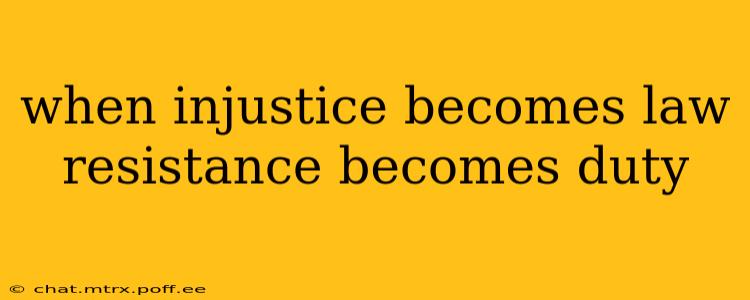The famous quote, "When injustice becomes law, resistance becomes duty," often attributed to Thomas Jefferson (though its origin is debated), encapsulates a powerful principle at the heart of numerous social and political movements throughout history. This maxim speaks to the moral obligation individuals feel when faced with systemic oppression and the crucial role of resistance in achieving justice. But what constitutes injustice? When does resistance become not just a right, but a duty? And what forms does this resistance take? This exploration delves into these critical questions.
What Constitutes Injustice?
Defining injustice is complex, as it's subjective and culturally influenced. However, certain common threads consistently emerge. Injustice typically involves the violation of fundamental human rights, including:
- Denial of equal rights and opportunities: This encompasses discrimination based on race, gender, religion, sexual orientation, or other factors, leading to unequal access to resources, education, and justice.
- Systematic oppression and exploitation: This involves the systemic subjugation of certain groups for the benefit of others, often manifesting in economic inequality, political marginalization, and social injustice.
- Violation of due process and the rule of law: When laws are unfairly applied, selectively enforced, or lack transparency and accountability, it breeds injustice.
- Abuse of power and authority: This involves the misuse of power by those in positions of authority, leading to corruption, tyranny, and the suppression of dissent.
When Does Resistance Become a Duty?
While the right to resist injustice is often acknowledged, the question of when it becomes a duty is more nuanced. Several factors contribute to this ethical calculus:
- Severity of the injustice: The more profound and widespread the injustice, the stronger the moral imperative to resist. Passive acceptance of genocide, for instance, represents a far greater moral failing than resisting a minor inconvenience.
- Effectiveness of other avenues: Resistance becomes a duty when peaceful and legal avenues for redress have been exhausted or proven ineffective. This often necessitates a careful assessment of the existing political and social landscape.
- Proportionality of the response: The means of resistance should be proportionate to the injustice being challenged. Violent resistance, while sometimes necessary, carries significant ethical and practical implications and should be a last resort.
- Probability of success: While hope is crucial, a realistic assessment of the likelihood of success is vital. Futile resistance, while morally laudable in intention, may cause more harm than good.
What Forms Does Resistance Take?
Resistance manifests in various forms, each with its own implications:
- Civil disobedience: This involves the deliberate violation of unjust laws as a means of protest and advocacy, often characterized by non-violent methods. Examples include boycotts, sit-ins, and peaceful marches.
- Activism and advocacy: This involves working within existing systems to challenge injustice, advocating for policy changes, and raising public awareness.
- Whistle-blowing: This involves exposing illegal or unethical activities within organizations or governments.
- Artistic expression: Art can serve as a potent form of resistance, conveying powerful messages of dissent and challenging prevailing narratives.
- Armed resistance: This is generally a last resort, considered only when all other options have failed and the threat to life and liberty is imminent. It's crucial to note that this carries significant risks and ethical complexities.
Is Resistance Always Justified?
While the principle of resistance against injustice is widely accepted, it's important to acknowledge that not all resistance is justified. Resistance can become problematic if it:
- Involves violence or harm: While self-defense is justifiable, violence should be avoided as much as possible.
- Targets innocent individuals: Resistance must be targeted at the perpetrators of injustice, not at innocent bystanders.
- Undermines democratic processes: While challenging unjust laws is vital, undermining democratic institutions can be counterproductive.
Conclusion
The quote, "When injustice becomes law, resistance becomes duty," highlights a fundamental tension between obedience to law and the moral imperative to fight injustice. Navigating this tension requires careful consideration of the nature of the injustice, the available means of resistance, and the potential consequences. Ultimately, the decision to resist is a deeply personal and ethical one, but the principle itself remains a cornerstone of social and political progress. Understanding its complexities is crucial in ensuring that resistance is effective, just, and contributes to a more equitable world.
